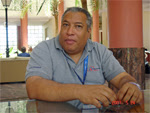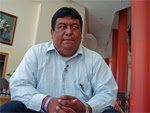.pa y .ni al detalle
Se presenta a continuación el tercer programa de audio (podcast), esta vez con los operadores de los ccTLDs .pa de Panamá y .ni de Nicaragua.
En este programa, ya no se hablará tanto de la historia de Internet en estos países sino de cuáles son los retos que enfrentan estos ccTLDs y los proyectos que tienen en curso y pensados a futuro.
 |
 |
 |
|---|
En esta ocasión hablan Armando Jipsion y Edna Samudio por .pa y Marvin Castañeda por .ni.
ENGLISH
This is the third audio podcast featuring ccTLD operators in Latin America. In this programme the ccTLD managers from .pa Panama and .ni Nicaragua talk about the challenges that their ccTLDs are facing and the projects they are implementing now and in the future.
Podcast roll
Armando Jipsion
(2:15)
Contacto Administrativo de .pa, NIC Panamá
Edna Samudio
(4:30)
Contacto Técnico de .pa, NIC Panamá
Marvin Castañeda
(9:20)
Contacto Administrativo de .ni, NIC Nicaragua
Programa de difusión de ICANN
El trabajo que realiza ICANN en las diferentes regiones sirve dos importantes objetivos de comunicación:
1. – El de llevar a ICANN las demandas de las comunidades regionales y locales;
2. – El de traer a la región información relevante sobre las discusiones y los procesos que suceden en ICANN a nivel global.
Se trata de ampliar el espectro de comunicación de ICANN, aplicándolo a diferentes idiomas y culturas. Se trata de abrir nuevos canales de comunicación que favorezcan la participación de nuevos actores (que puedan ser escuchados y puedan participar efectivamente en los procesos de ICANN).
La idea de este podcast es recuperar la experiencia de importantes actores de la región latinoamericana, como son los administradores de los códigos de país –que además en muchos casos coincide con aquellos que realizaron las primeras conexiones a Internet en sus países– para compartirla con una audiencia amplia de aquellos interesados en la evolución e institucionalización de Internet.
La ventaja de América Latina es que es una región bastante homogénea culturalmente y casi homogénea en términos de idioma.
ICANN’s outreach programme
The outreach work that ICANN carries out in different regions has two important objectives in terms of communication strategies:
1. – To facilitate a better understanding of the interest in and demands on ICANN from regional and local Internet communities;
2. – To share with the regional community relevant information about global discussions and processes currently under consideration in ICANN.
The outreach work also broadens the focus of ICANN’s communications to have them in different languages and fitting various cultural contexts.
It also opens new channels of communication to enhance participation of new players (who can be listened to and that have the chance to participate effectively in ICANN processes).
The idea behind the podcast that we are presenting is to recover the experience of important players in the Latin American region, such as the ccTLD managers –that in many cases correspond to those that first brought Internet connectivity into their respective countries–and to share it with a bigger audience interested in the evolution and institutionalization of the Internet.
Latin America has the quality of being a culturally homogeneous region in terms of culture and almost also in terms of language. This allows communications to be fluid and reach a great portion of the regional community.


Comments